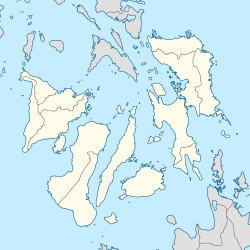| Molo Church | |
|---|---|
| Santa Ana Parish of Molo | |
 The church in August 2024 | |
Location in the Visayas | |
| 10°41′50″N122°32′41″E / 10.69722°N 122.54472°E | |
| Location | Molo, Iloilo City, Iloilo |
| Country | Philippines |
| Language(s) | Hiligaynon, English |
| Denomination | Roman Catholic |
| History | |
| Status | Parish church |
| Founded | 1831 |
| Dedication | Saint Anne |
| Consecrated | 1888 |
| Architecture | |
| Functional status | Active |
| Heritage designation | National Historical Landmark |
| Designated | 1992 |
| Architectural type | Church building |
| Style | Gothic-Renaissance |
| Groundbreaking | 1831 |
| Completed | 1888 |
| Specifications | |
| Length | 82.1 m (269 ft) [1] |
| Width | 28.7 m (94 ft) [1] |
| Width across transepts | 48.6 m (159 ft) [1] |
| Other dimensions | Façade facing southwest |
| Number of domes | 1 |
| Number of towers | 2 |
| Materials | Coral, Limestone |
| Administration | |
| Archdiocese | Jaro |
| Deanery | Saint Paul |
| Parish | Saint Anne |
| Clergy | |
| Priest(s) | Very Rev. Msgr. Jose Marie Amado S. Delgado., P.C. |
National Historical Landmarks | |
| Region | Western Visayas |
| Legal Basis | Resolution No. 4, s. 1993 |
| Marker Date | 1992 |
Santa Ana Parish Church, commonly known as Molo Church, is a Spanish neo-Gothic Roman Catholic church located in the district of Molo in Iloilo City, in the Philippines. It is under the jurisdiction of the Archdiocese of Jaro. The church is recognized as "the women's church" or "the feminist church" because it only features images of female saints inside, including Saint Anne, the patron saint of Molo. The National Historical Institute declared it a national landmark in 1992.














